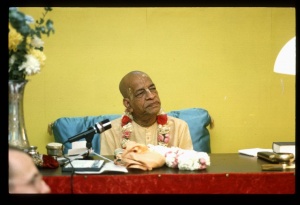SB 4.1.5

A.C. Bhaktivedanta Swami Prabhupada
TEXT 5
āninye sva-gṛhaṁ putryāḥ
putraṁ vitata-rociṣam
svāyambhuvo mudā yukto
rucir jagrāha dakṣiṇām
SYNONYMS
āninye—brought to; sva-gṛham—home; putryāḥ—born of the daughter; putram—the son; vitata-rociṣam—very powerful; svāyambhuvaḥ—the Manu named Svāyambhuva; mudā—being very pleased; yuktaḥ—with; ruciḥ—the great sage Ruci; jagrāha—kept; dakṣiṇām—the daughter named Dakṣiṇā.
TRANSLATION
Svāyambhuva Manu very gladly brought home the beautiful boy named Yajña, and Ruci, his son-in-law, kept with him the daughter, Dakṣiṇā.
PURPORT
Svāyambhuva Manu was very glad to see that his daughter Ākūti had given birth to both a boy and girl. He was afraid that he would take one son and that because of this his son-in-law Ruci might be sorry. Thus when he heard that a daughter was born along with the boy, he was very glad. Ruci, according to his promise, returned his male child to Svāyambhuva Manu and decided to keep the daughter, whose name was Dakṣiṇā. One of Lord Viṣṇu's names is Yajña because He is the master of the Vedas. The name Yajña comes from yajuṣāṁ patiḥ, which means "Lord of all sacrifices." In the Yajur Veda there are different ritualistic prescriptions for performing yajñas, and the beneficiary of all such yajñas is the Supreme Lord, Viṣṇu. Therefore it is stated in Bhagavad-gītā (BG 3.9), yajñārthāt karmaṇaḥ: one should act, but one should perform one's prescribed duties only for the sake of Yajña, or Viṣṇu. lf one does not act for the satisfaction of the Supreme Personality of Godhead, or if one does not perform devotional service, then there will be reactions to all one's activities. It does not matter if the reaction is good or bad; if our activities are not dovetailed with the desire of the Supreme Lord, or if we do not act in Kṛṣṇa consciousness, then we shall be responsible for the results of all our activities. There is always a reaction to every kind of action, but if actions are performed for Yajña, there is no reaction. Thus if one acts for Yajña, or the Supreme Personality of Godhead, one is not entangled in the material condition, for it is mentioned in the Vedas and also in Bhagavad-gītā that the Vedas and the Vedic rituals are all meant for understanding the Supreme Personality of Godhead, Kṛṣṇa. From the very beginning one should try to act in Kṛṣṇa consciousness; that will free one from the reactions of material activities.